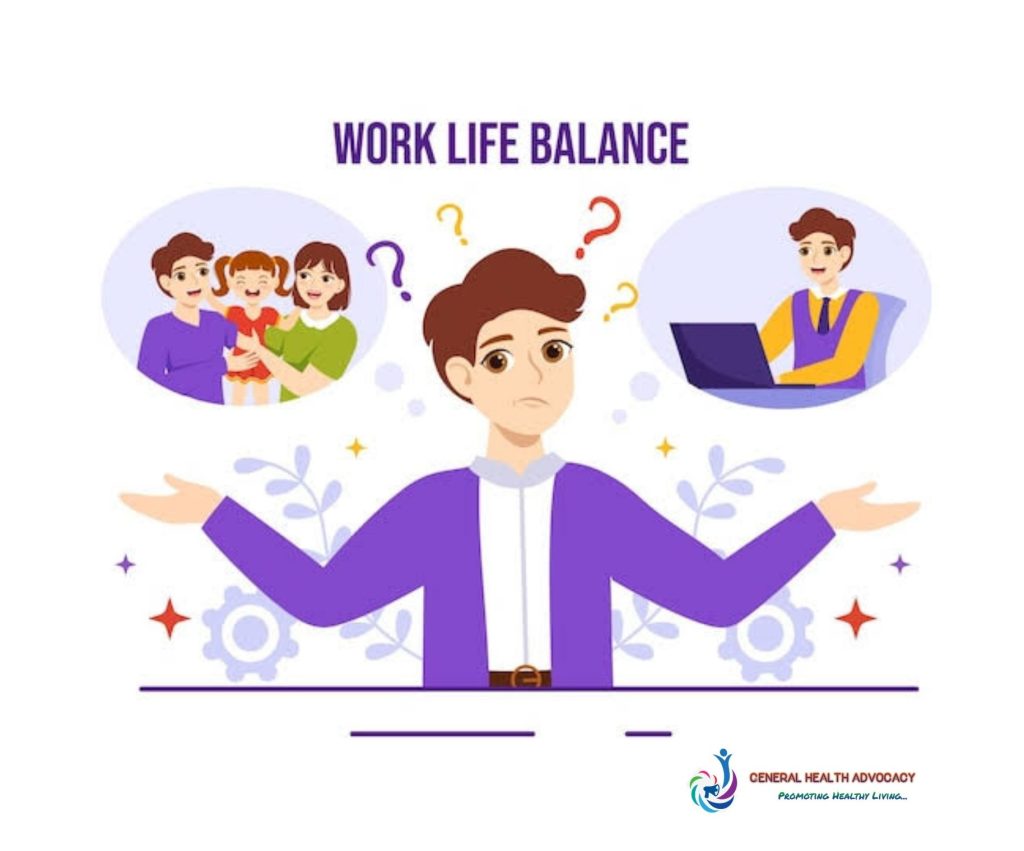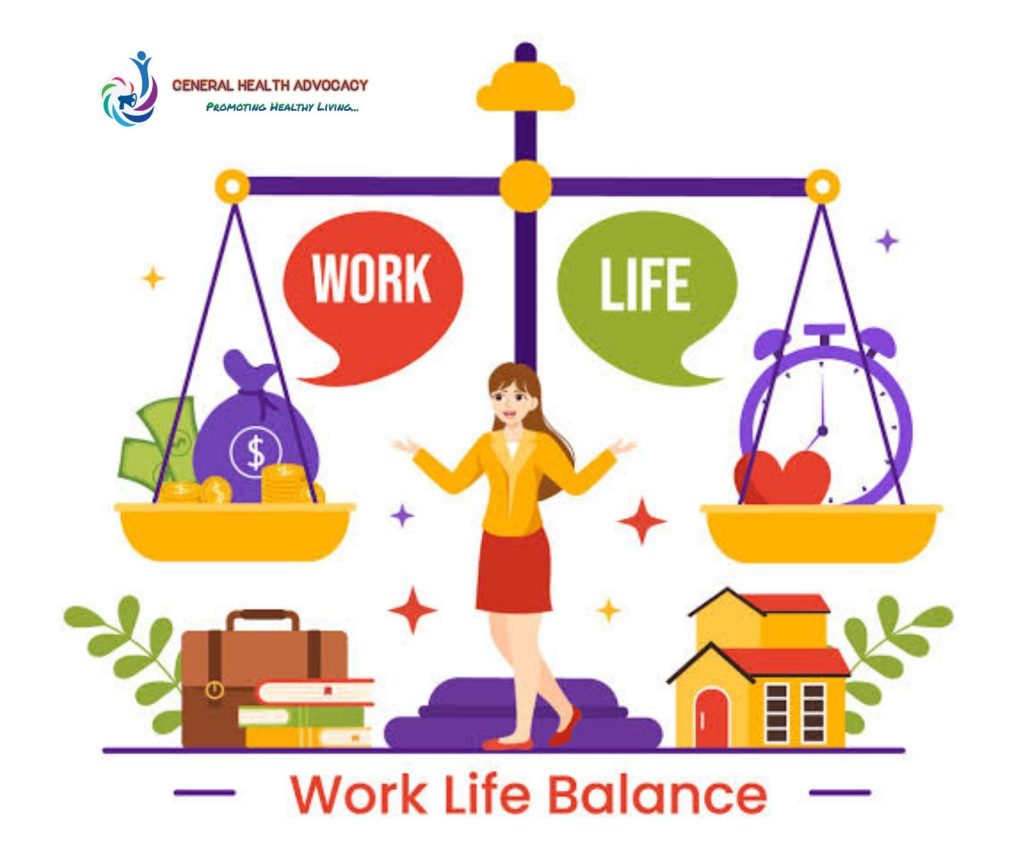Maintaining Well-being, Creating Harmony: How to Effectively Manage Work and Personal Life

Work-life balance is typically defined as the amount of time you spend doing your job versus the amount of time you spend doing what’s important to you outside of work, whether that is with loved ones or pursuing personal interests and hobbies. Work life balance encourages employees to divide their time on the basis on priorities and maintain a balance by devoting time to family, health, vacations etc.
Managing work and personal life is essential for maintaining overall well-being. Balancing these two aspects of life can be challenging, but with the right strategies, it is possible to achieve a healthy equilibrium.
Here are some tips on how to manage work and personal life for well-being:
- Prioritize and set boundaries: Determine your top priorities in both work and personal life. Set clear boundaries between the two and learn to say no when necessary. This will help you allocate time and energy appropriately for each aspect of your life.
- Create a schedule: Plan your days and weeks in advance, including both work-related tasks and personal activities. Set realistic goals and deadlines to avoid overworking or neglecting personal commitments.
- Practice effective time management: Identify time-wasting activities and eliminate or minimize them. Use productivity tools and techniques such as time blocking, Pomodoro technique, or task batching to enhance your efficiency.
- Delegate and ask for help: Don’t hesitate to delegate tasks at work or seek help when needed. Collaborating with colleagues or outsourcing certain responsibilities can reduce your workload and allow you to prioritize personal life.
- Maintain work-life boundaries: When you are not working, avoid checking emails or responding to work-related calls unless it’s an emergency. Dedicate uninterrupted time to your personal life to recharge and rejuvenate.
- Practice self-care: Take care of your physical and mental health by incorporating self-care activities into your routine. This can include exercise, meditation, hobbies, adequate sleep, healthy eating, and spending quality time with loved ones.
- Set realistic goals: Avoid setting unrealistic expectations for yourself in either work or personal life. Be mindful of your limitations and focus on achievable goals that promote a balanced and fulfilling lifestyle.
- Communicate effectively: Maintain open and honest communication with your colleagues, superiors, and loved ones. Clearly express your needs, concerns, and boundaries to ensure understanding and mutual support.
- Disconnect from technology: Limit screen time and digital distractions, especially during personal time. Engage in activities that promote social interaction, creativity, and relaxation.
- Seek support: Build a support system that includes friends, family, or mentors who can provide guidance, advice, and emotional support during challenging times. Connect with like-minded individuals who understand the importance of work-life balance.
- Take regular breaks: Incorporate breaks throughout your workday to rest and rejuvenate. This allows you to maintain focus and productivity while preventing burnout.
- Practice gratitude: Regularly express gratitude for the positive aspects of your work and personal life. Cultivating a mindset of gratitude can help reduce stress and increase overall well-being.
- Learn to manage stress: Stress is inevitable, but how you manage it is crucial. Develop effective stress management strategies such as deep breathing exercises, mindfulness meditation, or engaging in stress-relieving activities like yoga, walking in nature, or listening to calming music.
- Set realistic expectations: Understand that work-life balance will look different for everyone, and it may vary depending on different stages of life and career. Embrace flexibility and adaptability, and avoid comparing yourself to others.
- Practice work-life integration: Rather than viewing work and personal life as separate entities, aim for integration. Find ways to incorporate personal activities into your workday, such as taking breaks for exercise, scheduling personal appointments during work hours when possible, or finding hobbies or interests that can align with your work.
- Learn to disconnect: Create boundaries between work and personal life by designating specific times or days for relaxation and personal activities. Avoid bringing work-related stress into your personal life and vice versa.
- Regularly evaluate and reassess: Periodically assess both your work and personal life to identify areas that may need adjustment. Reflect on your values, goals, and priorities, and make modifications as needed to ensure alignment with your desired work-life balance.
- Take vacations and breaks: Allow yourself to take time off from work and fully disconnect. Use your vacation time to recharge, explore new experiences, and spend quality time with loved ones.
- Develop healthy coping mechanisms: Instead of resorting to unhealthy habits like overeating, excessive alcohol consumption, or neglecting self-care, find healthier ways to cope with stress or challenges. This can include talking to a therapist, engaging in hobbies, journaling, or seeking support from loved ones.
- Practice self-compassion: Be kind to yourself and acknowledge that finding a perfect work-life balance is a continuous journey. Learn to forgive yourself for any perceived shortcomings or mistakes, and prioritize your well-being above all else.

It’s important to remember that, achieving and maintaining work-life balance requires ongoing effort and adjustment. It is a journey that evolves as your priorities and circumstances change. By implementing these healthy habits and strategies, you can promote a healthier personal life and overall well-being.